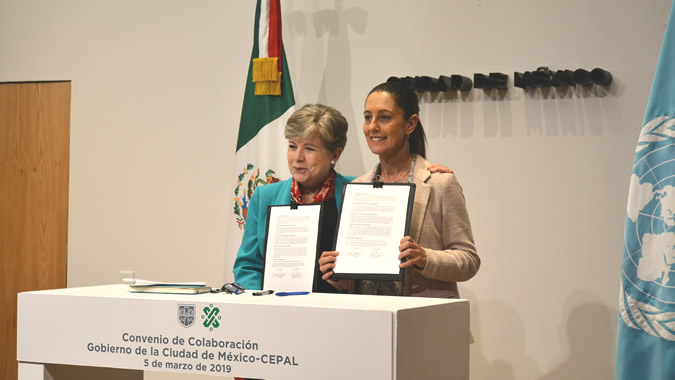ECLAC and Mexico City’s Government Sign Cooperation Agreement for Developing and Implementing Policies that Combat Inequality
The Executive Secretary of the United Nations organization, Alicia Bárcena, met with the Head of Government of Mexico City, Claudia Sheinbaum.

The Executive Secretary of the Economic Commission for Latin America and the Caribbean (ECLAC), Alicia Bárcena, and the Head of Government of Mexico City (also known as CDMX), Claudia Sheinbaum, signed a technical cooperation agreement today to carry out economic, social and environmental policies that combat inequality in the Mexican capital.
The signing ceremony took place this Tuesday, March 5, in Mexico City and was attended by authorities from the United Nations system in Mexico as well as representatives from the Mexico City Government’s workforce and ECLAC’s Subregional Headquarters in that country.
“Mexico City is a reference point for policies and innovation, and with this new administration (Claudia Sheinbaum’s) there are big expectations that it could become a great example of a modern city where also inequality gaps can be closed and something that many of us have aspired to can be achieved, which is environmental sustainability,” Alicia Bárcena stated at the event.
The Executive Secretary of the UN regional organization highlighted the importance of working on the concept of the right to the city and of the city as a macro public good, meaning a place where public goods of all kinds are present: public spaces, the right to connectivity and the right to financial inclusion, among others. She explained that this cooperation agreement is focused precisely on these areas and, above all, on inequality, which is the major issue that ECLAC has been working to address in the last decade.
“We have given our all on the issue of inequality, to the point of demonstrating that it is inefficient. It is not only unethical to have inequality, it is not exclusively a matter of not respecting the universality of rights and people’s right to equal access as citizens, but it is also inefficient from an economic perspective,” she stressed.
Bárcena also indicated that this agreement with Mexico City represents an important opportunity to move forward on the application of the 2030 Agenda for Sustainable Development – the road map approved by the United Nations to achieve greater well-being for the peoples of the world – which constitutes a paradigm shift.
In her remarks, meanwhile, Claudia Sheinbaum thanked ECLAC for this collaboration and indicated that with this agreement Mexico City will be able to carry forward its government platform based on reducing inequalities. Work will be done on social, environmental, digital and economic-system agendas, as well as in areas related to financial inclusion, territorial planning and the closing of gaps.
“ECLAC is at the forefront of this discussion on an international level, and the documents produced by the commission have been essential for us to be able to build the city’s agenda. ECLAC will collaborate with us on the analysis, drafting, coordination and implementation of our policies. This is about very intense collaboration to develop the platform we have,” Sheinbaum underscored.
Sheinbaum added that in addition to the issue of reducing inequalities, ECLAC will cooperate with Mexico City on its links to other cities in the world, particularly in Latin America, with the aim of incorporating all the good practices that have been developed in other places. “Our platform is concentrated on the words innovation and rights. Ultimately, the idea is to see how inequalities can be reduced in an innovative way. We advocate for all the inhabitants of Mexico City – men and women – to have access to the major rights: from the right to education and health, to the right to connectivity, or the right to justice,” she said.
Subregional headquarter(s) and office(s)
Country(ies)
-
Mexico
Contact
Public Information Unit
- prensa@cepal.org
- (56 2) 2210 2040